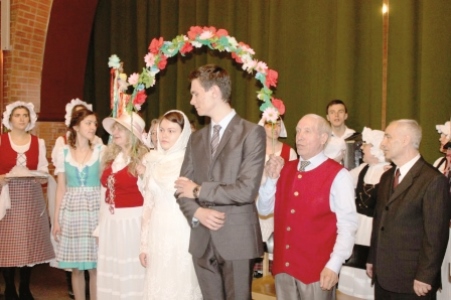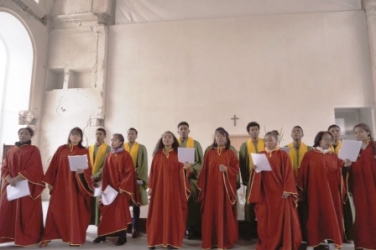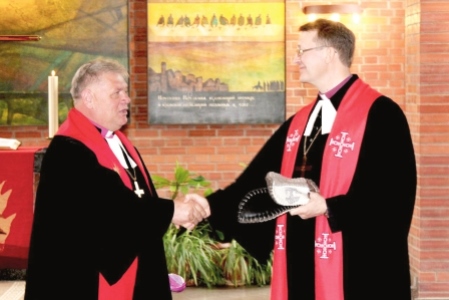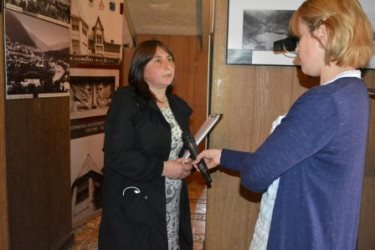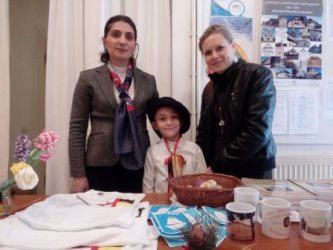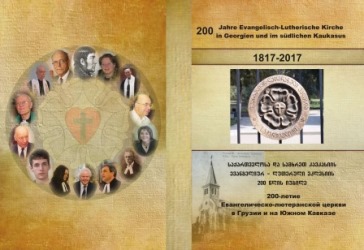|
|
April 2017Moments of Silence in Petrikirche St. Petersburg On April 6, the third day of mourning for victims of the terrorist attack in the St. Petersburg subway, there was a concert at Sts. Peter and Paul Сhurch - “The World of the Cantatas of J.S. Bach.” This joint German-Russian musical project – one of the highlights of the 14th annual Week of Germany in St. Petersburg – gathered no fewer than 400 guests to the Lutheran Cathedral. After the completion of the restoration of the organ gallery this concert was the first event in the building of Petrikirche. At the opening of the concern Pastor Michael Schwarzkopf spoke about how he had just returned from an event of public mourning at the “Technologichesky Institute” subway station. There representatives of all Christian confessions and various other religions had gathered together with representatives of the government in order to state their common opposition to terrorism.
Everyone at the church rose for a minute of silence. The well-known “Reformation Cantata” of Bach (based on the text of Martin Luther's «Ein feste Burg ist unser Gott») was performed; this piece was, without a doubt, a special gift to the Lutheran church from the project planners during this, the 500 anniversary of the Reformation.
A New Area Dean in Saratov Saratov On April 9th, Palm Sunday, we congratulated our brother and Pastor Andrey Dzhamgarov on his installation as Area Dean of the Saratov deanery. He has enthusiastically cared for the Saratov congregation for quite some time. Now he becomes the shepherd of a larger herd. It seems to have been only recently when his young wife Olga came to the church for the first time. Andrey brought her from another city. Together with Irina Scheiermann, the wife of Pastor Alexander, Olga began to help teach the children in Sunday school. Although Andrey had a great respect for the church, he did not go to church services. And if he sometimes came, he slept peacefully on the last bench. But the word of God is for the heart like a constant drop for the stone. It carves and gives it a completely different form.
Dean Andrey Dzhamgarov One day, Pastor Alexander Scheiermann visited the Dzhamgarov family. At the table, he told Andrey's parents, "You'll see, Andrey will become a Pastor." Mrs. Dzhamgarov laughed and said, "No, Andrey will NEVER be a Pastor!" But God's view is different from our human view, for “people look at the outward appearance, but the Lord looks at the heart.” Perhaps Olga Dzhamgarov was inspired by the words of the Apostle Peter that men who do not believe the Word of God “may be won over without words by the behavior of their wives” (1 Peter 3, 1). With patience, prayer, humility, unchanged obedience, and deep respect for your husband and his family she watched for more than 20 years how the Lord "woke up" her husband Andrey. But the awakening did not start very brightly for Andrey from the perspective of a "normal" man. He lost his job, and his family got into a very difficult financial situation. For Andrey the humanitarian aid in form of food and clothing that brought Olga from the church became an important testimony of the love of God and brotherly care (in the Dzhamgarov family a daughter was born at that time). He began to go to church more often, to have fellowship with the faithful, and then to help Pastor Alexander at work. Despite the very modest conditions under which they lived, singing and laughter were heard in the house of Andrey, Olga and the little Adelina. Sunday guests often gathered at their humble table. In the meantime, Andrey began to preach in worship sometimes, to visit other congregations with the pastor and to serve everywhere where he had the opportunity. In 2004 God blessed the family Dzhamgarov with son David, and now Andrey and Olga have two beautiful children. We wish our beloved brother and valued Pastor and Dean Andrey God's blessing in service and spiritual growth. Elena Schumakova
The Long-Awaited Organ Arrives! St. Petersburg The Walker organ of the Cathedral of Sts Peter and Paul was lost at the end of the 1930s; now it has been replaced with a Willi Peter organ that had previously been in use from 1973 to 2016 in St. Gertrude's church in Stockholm.
The parts for the new organ were brought on April 21 and 22, and on April 25 experts from the Becker Company in Hamburg began their work on installation. The plan was that the organ installation should be finished by June 8 with the first concert planned for July 1. Gerhart Reutter
The Social Mission of Christianity Ufa Anyone who has ever visited a temple of any confession knows is familiar with the scene of beggars on the steps, the poor who ask for a penny and offer to pray for you in return. There is nothing unusual about this; we are used to seeing these “people of God” who are willing to pray for us, since it seems that we have little time for that ourselves. 500 years ago, however, Martin Luther thought that something needed to be done about poverty, that it wouldn't do to have a neighbor enslaved by hunger and need. Lutherans eventually began a movement – the diaconal movement – to serve orphans, the poor and homeless. All over the world Lutheran congregations distribute clothing and groceries to the needy, volunteer to take care of the elderly and the sick. Not that long ago a diaconal enter was established at the Lutheran congregation in Ufa. On April 6-8 there was a seminar about the development of diaconal ministry there. Rainer Stahl, long-time secretary of Martin-Luther-Bund as well as visitation bishop Norbert Hintz and his wife Elizabeth took part. Local participants included the pastor of the Ufa congregation, Genrich Minich, the Area Dean of Bashkortostan Sergei Goltzvert, church council president Elvira Gartman and members of the Ufa congregation.
The guests spoke in detail about the principles of diaconal ministry and its history as a social phenomenon. Elizabeth Hintz spoke about the wife of Martin Luther, Ekaterina von Bora, who was a great supporter of Luther in his work as well as being a wonderful mother and housewife. At the end of the seminar there was an organ concern during which those in attendance had the chance to appreciate this type of spiritual music. Sergei Rusakov
Сhurch Сonstruction in Saratov Saratov “Great are the works of the Lord, studied by all who delight in them“ (Ps. 111:2) Dear brothers and sisters, as of April I am no longer Deanfor the Saratov region. But I am happy to to bring an update to those who care about our church building, who are praying for us and helping with the current progress.
Since the end of 2016 work has been done on the church hall: the скн room, the balcony and the church walls. The plastering has been be done as far as possible in the large church hall. With two to four people, a few dozen bags of plaster mortar, a compressed air-driven plastering machine and mobile scaffolding, etc., quite a few things could be done.During and after Easter the work in the church hall went on “pause.” Since then the work joyfully continues. It is hoped that the plastering will be completed in the near future, and then the ground tiles will be done. Further, after Easter, the room for the planned diaconal clothing store in the lower floor was equipped with wooden shelves so that Sister Maren can soon begin this important work. Thanks for all the help! Alexander Scheiermann, Michael Weise
Third International Academic Conference “Lutherans in Russia” Omsk On April 22 and 23, 2017, the Department of Civic Relations and Social Politics of the city of Omsk, the Omsk State Technical University, the Omsk State Regional History Museum, the Omsk German Ethnic-Cultural Society, and the Evangelical Lutheran Church of the Urals, Siberia and Far East hosted an academic conference. More than 150 people from many cities in Russia (including: Moscow, St. Petersburg, Omsk, Ekaterinburg, Vladivostok, Irkutsk, Krasnoyarsk, Chelyabinsk, Novosibirsk and others) and foreign countries (Germany, USA, Switzerland) took part. The seminar's participants were greeted by the vice governor of the Omsk oblast, V.B. Kompaneishchikov, ELCR Archbishop Brauer, the Vice-consul of the Federal Republic of Germany from Novosibirsk Ms. Gruenich, the Vice-President for theology of the Evangelical Lutheran Church of Hannover, Arend de Fries, Rainer Bekker - the director of the Marburg Mission - and Bishop Yuri Novgorod, the chair of the Council of Bishops of the Union of Evangelical Lutheran Churches and the Bishop of the Evangelical Lutheran Church of Kazakhstan. The plenary session was opened by Arend de Fries with his paper: “Celebrating the Anniversary of the Reformation in the Era of Ecumenism: voicing hurts, healing memories.” He focused on the main ideas of Martin Luther as they were reflected in the theology of the Reformation, the influence of the ideas of the Reformation on the mindset of Christians, on social relationships and on the understanding of God (doctrine of justification). Interconfessional dialogue, the rethinking and reshaping of Christian faith, and the eventual drawing closer together of the the Evangelical and Roman Catholic Churches is a result of Lutheran theology.
"The german wedding" by the Omsk Ethnic-Cultural Society L.M. Dmitrieva, Ph.D., head of the Philosophy department at Omsk State Technical University, drew participants' attention to the influence of Protestantism on European civilization in the 17th-18th centuries. The director of the regional history museum, P. Vibe, Ph.D., in his paper explored the mindset and activity of German colonists on their adaptation to the conditions of Siberia; he used the Omsk region as an example. (19th-first third of 20thcenturies). Professor A.N. Gumenyuk of Omsk State Technical University gave a deep analysis of the traditions of Protestant church architecture based on the example of St. Catherine's Lutheran Church in Omsk (1790-1792), noting the signs of late “Petrine Barocco” of the end of the 18th century. Dr. Anton Tikhomirov, President of the Novosaratovka Theological Seminary, in his paper looked at the basic principles of “dramatic homiletics” - an important movement in Western approaches to preaching. After a small concert by the Omsk Ethnic-Cultural Society, the conference continued its work in the following round-table groups: Protestant philosophy and theology, the cultural/historical role of Protestantism, and Germans of Siberia: church, family, traditions. The conference participants were very active and asked many questions of those who gave their papers during the plenary session and roundtables. The first day of the conference ended with a concert of German composers performed by the Chamber Orchestra of the Omsk Philharmonic. On April 23 the conference continued its work in the Omsk State Museum of Regional History, where participants had the chance to get acquainted with exhibits and the museum's recently issued, 300+ page album entitled: “The History of Russian Germans in the Collections of the Omsk State Regional History Museum.” At the same time the exhibit “Here I Stand and I Can Do No Other – the 500th Anniversary of the Reformation” opened to great interest. The papers of the conference were published. It is worth noting the warm atmosphere that could be felt at the conference. Professor Dr. L.M. Dmitrieva, chair of the organizing committee.
Council of Bishops Omsk On April 24at the end of the celebratory events in the Christ Church Center the annual meeting of the Council of Bishops of the Union of Evangelical Lutheran Churches (ELC) was held. Tradition has it that the meeting takes place every year in a different member church of the Union. This year attending were: ELCR Archbishop Dietrich Brauer, Bishop Alexander Scheiermann of the ELCUSFE, Bishop Alfred Eicholtz from the Evangelical Lutheran Church of the Republic of Kyrgyzstan) and the chair of the Union, Bishop Yuri Novgorodov from the Evangelical Lutheran Church in Kazakhstan. The other bishops of the Union – Hans-Joachim Kiderlein from Georgia and Sergei Mashevski from the German Evangelical Lutheran Church of Ukraine, had scheduling conflicts that did not allow them to attend.
Hymns from Madagascar in a city of the Golden Ring Yaroslavl On April 22 a long hoped-for event took place – the trip of the French-speaking Evangelical Lutheran Congregation in Moscow to Yaroslavl. The youth choir prepared a special paschal program for their performance in the “kirche.” Despite the biting cold in the church (since it is still under construction there has been no heat for many years ) the sanctuary was full. Members of the congregation came; they prepared tea and snacks for guests from the city. The vice mayor of the city, Vyacheslav Gavrilov, welcomed the guests. The choir, for their part, gave him souvenirs from Madagascar (where most of the members of the congregation are from) as a sign of thankfulness for his support. Area Dean Elena Bonderenko, Pastor Ivan Shirokov from the Yaroslavl congregation, and preachers Artis Petersons and Mamy Rakotonitama each said a few words of their own.
The choir, directed by Fara Rakoto, performed traditional French Easter hymns, Malagasi and contemporary Christian songs. The choir was accompanied by the pianist of the Moscow Protestant Congregational Jacquis Steve Andriamampiarintsoa and his spouse Farrah Ramboarifina (the director of the MPC choir) also joined the performance. On that day that French-speaking congregation took with them a new paschal candle to light it from the candle of the Yaroslavl congregation. This candle became a symbol of the light of the Gospel which believers share with one another, confirming in this way that victory of the Risen Christ. Elena Bondarenko
Installation of Alexander Scheiermann as Bishop of the ELCSUFE Omsk It was a weekend full of significant events for the Evangelical Lutheran Church of the Urals, Siberia and Far East. At worship on the 23 of April in the sanctuary of the congregation in Omsk around 200 people came together in order to witness to the blessing and installation of Bishop Alexander Scheiermann. Congregation members, representatives from the city administration, and guests from various churches and countries all took part in this festive day. The church was honored to have present the Archbishop of the Evangelical Lutheran Church of Russia Dietrich Brauer, the Vice Consul of Germany in Novosibirsk Lucia Griunich, Arend de Fries, the Vice President of the Evangelical Lutheran Church of Hanover, representatives of other partner organizations and missions, the representative of the mayor of Omsk Marina Schterger - the head of the department for religious and ethnic affairs, Bishop Yuri Novgorodov - the chair of the Council of Bishops of the Union of Evangelical Lutheran Churches and bishop of the Evangelical Lutheran Church of Kazakhstan, Alfred Eicholtz, the Bishop of the Evangelical Lutheran Church of Kyrgyzstan, as well as pastors from congregations from the Urals to the Far East and representatives of churches from the USA, Germany, Switzerland and the CIS.
Bishop Alfred Eicholtz (on the left) and Bishop Alexander Scheiermann
Alexander Scheiermann was born in the Omsk oblast and has enormous experience in congregational ministry. Alexander and his family lived for a while in Germany, received theological education in Switzerland and then served as a pastor in congregations in Moscow, Omsk and for quite some time as Area Dean in Saratov. In October 2016 he was elected Bishop at the 25 Synod Assembly of the Evangelical Lutheran Church of the Urals, Siberia and Far East. Long before the beginning of the service the sanctuary was filled with congregation members, and at noon Pastor Evgeny Filippov opened the celebratory worship service with the traditional Lutheran greeting. After the ceremony of installation Alexander already gave his sermon as the Bishop. He and his wife received congratulations and gifts from guests, colleagues, and partners. A special surprise for everyone was the presence of unexpected guests – Alexander's school classmates, who also were there to congratulate him. Many warm words were shared during the worship service, and all the members of ELC add support and prayers from afar that God would bless and guide Alexander in this new stage of his ministry.
Celebration of the 200th Anniversary of the Arrival of German Colonists in Borzhomi Borzhomi On April 12 in there was event dedicated to the 200thanniversary of the arrival of German settlers in Georgia. The Evangelical Lutheran congregations in Borzhomi, Kutaisi and Tbilisi and the Evangelical Baptist congregations in Tbilisi, Gori and Batumi were represented at the event; also in attendance was the leader of the inter-religious committee of the Georgian Ombudsman Beda Mindiashvili.
The church council president from Borzhomi, Nana Kapanadze, gave a Holy Week sermon which was followed by the opening of the exhibition which showed artifacts from everyday life of Germans who lived in Borzhomi. After that everyone left for the regional history museum in Borzhomi for a conference on the theme “The Contribution of Germans to the Development of Borzhomi.” The conference, which was taped for a local TV station, also featured a concert. There were more than 80 people present for the reception after the conference. Nana Kapanadze
200th Church Anniversary in Georgia Tbilisi The celebration of the 200 years of the establishment of the Evangelical Lutheran Church in Georgia began on Saturday, April 8. A summer cafe (“The Martin Luther Cafe”) was opened up in the garden on the terrace; this was possible thanks to the equipment given to us by a congregation from the German city of Heppenheim. This cafe with live accordion music for accompaniment was at the center of the next two days’ events, even if the prices there didn't fully cover expenses. The children from the congregation in Rustaveli performed a German dance and two of them played on the flute. In the yard in the evening when it was cold and dark, music by a jazz trio was muffled by a storm. In the first half of the day Temuri Bardavepidze and 12 representatives of the youth used Georgian to tell the story of the history of our church starting with German settlers in 1817 until 1917; they did the same thing in the evening, only in Russian. In the second half of the day Pastor Irina Solei spoke about the very difficult times between 1917 and 1991. She invited Nina Mindiashvili, the granddaughter of the last pastor from Tbilisi, the martyr Richard Maier, to join her for conversation. Earlier in the entryway an exhibition of artistic black and white photos was set up that, together with items from everyday life of German settlers, helped tell the history of the church. Elena Ilinets presented her tri-lingual (Georgian, German, Russian) publication, the first attempt of our newsletter publishing team to print a book. Then Irina Solei and Kristina Hummel spoke about the time of rebirth of the church since 1991. Pastor Albina Zotova led evening prayer.
A joint worship service of all the congregations of the church was held on Sunday morning, April 9, also in 3 languages (or four if you count the prayer in Azerbaijani that was part of the service as well). Pastors Irina Solei, Viktor Miroshnichenko and I led the service which lasted two hours. Among those in attendance were a group of tourists from the Evangelical congregation in Heppelheim. The Tbilisi congregation shared the offering from that service with the congregation in Baku, which was represented by 4 congregational members. Many people say that the celebrations went really well. On the morning after the celebrations, I sat down to write a letter to the President of Georgia expressing my disappointment that the national government sent no state representatives even to the Saturday evening event. The only country represented was Germany – by Ambassador Heike Paich. However the Georgian Orthodox Church honored us with its presence in the person of Protopresbyter Georgia Zviadadze, who welcomed us with great appreciation for our tradition. Also with us were our friends from the Evangelical Baptist, the Armenian Apostolic. Roman Catholic, and Adventist churches. Of course Pastor Varlam Ramishvili from Batumi and Beka Mindiashvili from the Committee of Religions were also there. Hans-Joachim Kiderlen
The Best Gift is a Book! Tbilisi The working group of Hans-Joachim Kiderlen, Kristina Hummel, Pastor Irina Solei and Elena Ilinets worked hard to prepare for the 200th anniversary of our church. On April 8 I had the honor of presenting a publication in which articles were gathered about the history of Swabian settlers from 1817 to 1991. The authors told in an accessible and interesting way why the Swabians immigrated, about the foundation of their colonies, their everyday lives, the tragedies and triumphs of this hard-working people, as well as their cultural and religious life. In this memorial publication the deportation of Germans in 1941 and the re-birth of the Lutheran church in the 1990s are also reflected. Usually when you hold a book in your hands you don't think much about what a difficult and long path it takes to publication. Our working group walked that path. The first issue of our “Church News” in 3 languages was printed in July 2001. It looked very primitive, but with time our working group creatively developed and improved our skills in publishing. With time the monthly “Church News” publication steadily transformed into a higher quality product; we've also published brochures and booklets. And now the chance came along to try out printing a book. Of course it wasn't easy and it was even a bit scary – do we have the skill and strength enough to meet the challenge of printing something of professional quality? It took time to prepare for printing; as usually, we didn't have enough of it. It took us two months to prepare the publication while usually books in such a format take significantly longer to prepare for publication.A three-language publication is not by any means an easy thing! The translation always needs stylistic corrections since we hold to the norms of literary translations.
Having received and edited the translations we were able to start with the design, with the choice of font and finding photos that fit in terms of theme and quality. I want to first and foremost thank the authors who responded to our call and made a contribution to this anniversary publication – the Bishop of the Evangelical Church in Wurttemberg Frank Otfried July, the Ambassador of the Federal Republic of Germany in Georgia Heike Paich, the chair of the foundation for the assistance of the ELCG, Juergen Helwig, Christina Hummel, Bishop Hans-Joachim Kiderlen, lector Temuri Bardavelidze, Pastor Irina Solei, Pastor Garri Azikov, the President of the Association of Germans of Gerogia Garri Augst. Vera Nesterova and Natalia Bairamova from the Church of the Savior in Baku, and Architect-Restorer Nestan Tatarashvili. We would also like to thank the translators and editors and all who contributed to the design. Shamil Somhishvili in particular suggested an interesting idea for the cover and made it himself – a circle made of portraits of pastors (including the first pastor, Johann-Bernhart Saltet and the last pre-Revolutionary pastor, Richard Maier) and bishops of the ELCG around the Luther rose. It ended up being a wonderful symbol that unites the past and present of our church. For me it was especially interesting to do something with such a high degree of responsibility – publishing a book. How well it worked will be for our readers to decide. Elena Ilinets
|

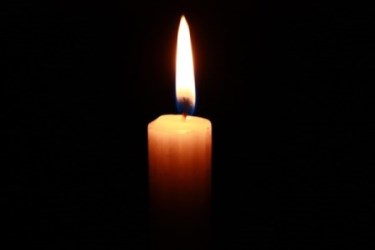
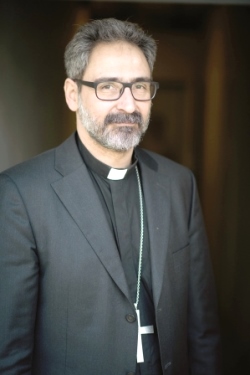
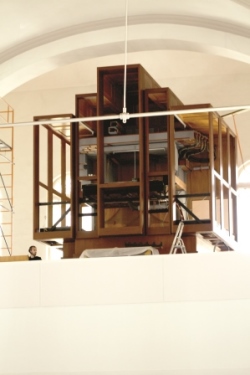
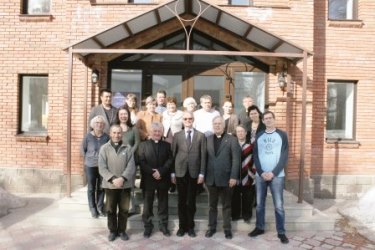
.jpg)
